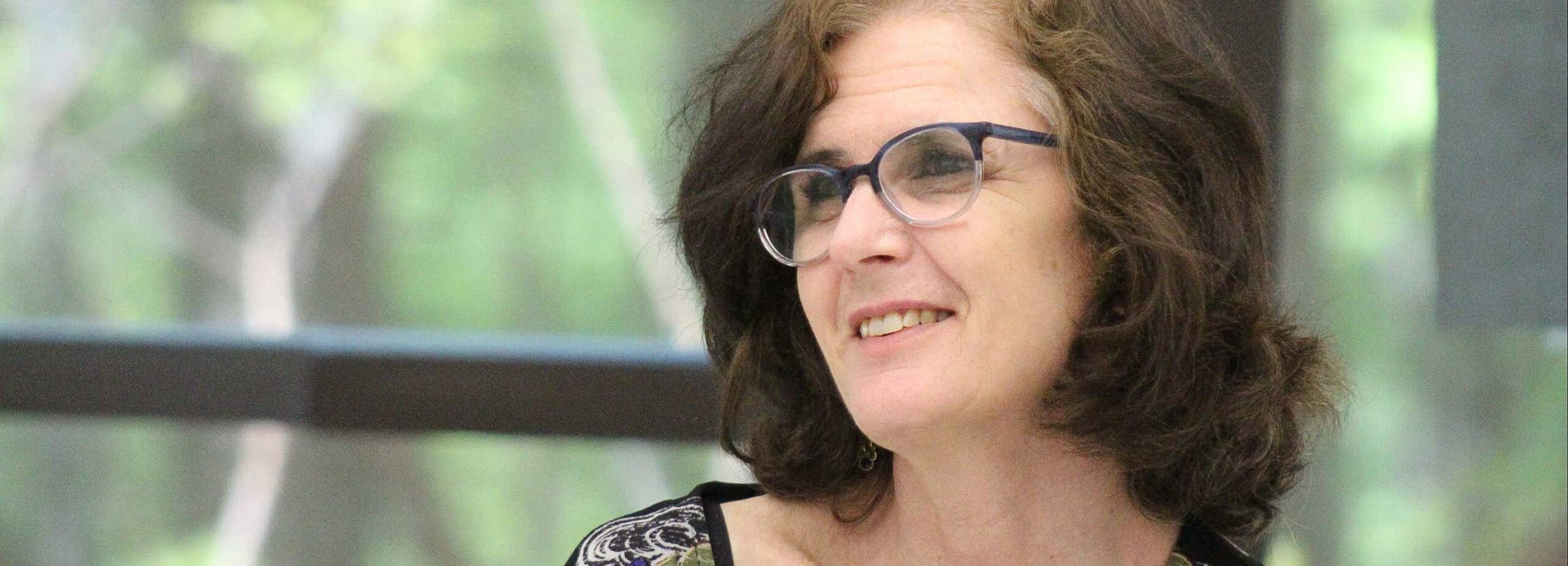Community Blog Hakker Na, Recognize This: It’s Why She Teaches

A conversation with Dr. Rachel Adelman, Associate Professor of Bible at Hebrew College
It was a cold, rainy, winter night in Jerusalem, and a surprisingly warm sunny afternoon in Boston, when Dr. Rachel Adelman and I connected thousands of miles apart to video chat about what it is like to teach community learners in Hebrew College’s Me’ah and Open Circle Jewish Learning programs. As a first-year rabbinical student at Hebrew College, I had seen Dr. Adelman around the building, always with a smile that seemed to suggest that she had something on her mind. Or I’d hear her excited voice resonate through the walls as she taught a class on the Bible. You see, she loves what she does—teaching Torah—because Dr. Rachel Adelman loves Torah.
When asked what her favorite moment in Tanach is, Dr. Adelman’s facial expression changes from speculation to excitement as she recounts the moments with Judah and Tamar (Genesis: 38). Tamar is the daughter-in-law of Judah, and he thinks she has caused the death of two of his sons. Judah sends her off as a widow and neglects her with the false promise to marry his youngest son. She then dresses up as a harlot and seduces him by the side of the road in exchange for his seal, cord, and staff. A few months later it is discovered that Tamar is pregnant and Judah proclaims that she should be burned.
As she is being brought out to be burned, Dr. Adelman recounts, Tamar sends a message to Judah stating “I am pregnant by the owner of these items. הַכֶּר־נָ֔א- Hakker na, recognize this.” Recognize these items — the seal and cord and staff. As Dr. Adelman continues to recount these events, she pauses at the words hakker na and describes the scene as only a true scholar can — with a deep intimate connection to the actions of Tamar. With her eyes closed and an intense look of concentration, she explains that Judah does recognize the items and takes responsibility for what he has done to Tamar. Dr. Adelman describes this moment of hakker na — “recognize this” — as a phenomenal occurrence and has a tremendous amount of respect for the level of risk Tamar took. Until this moment Judah is not a likable character, but after these events, he goes through a profound transformation that could happen only because of Tamar’s actions. For Dr. Adelman, the people of Tanach are not just figures in an ancient tale; they are her friends, her role models, her colleagues, and her teachers. They walk with her throughout her journey as an educator and foster relationships so personal that it makes me as a student crave to hear more. I want to know what it is like to have Moses by your side and be in constant communication with him, or to dream of meeting with Miriam after she crosses the sea and dances with the Israelite women. Dr. Adelman wants to know what transformation enabled Miriam to go from slavery to that moment — what was the power of her dance and where does her music come from?
During our conversation, Dr. Adelman continues to share how she would like to meet Miriam, but is unsure if Miriam would be willing meet with her. This subtle comment of wonderment causes me to gain respect for the level of humility she has for these figures in Tanach. She understands their roles at such a personal and intimate level. This type of humility allows for Dr. Adelman to proclaim that she wants to comfort Miriam when she is inflicted with a skin disease after talking ill about Moses, when she is cast out of the camp and is found wandering the desert. Dr. Adelman’s voice goes soft, and once again she closes her eyes, as she continues to explain with understanding and empathy how she would meet Miriam in her exile and share in her pain at this moment. She wants to convey to Miriam that while she is excluded and punished by God for a seemingly small offense, she is not alone.
When asked who from Jewish liturgy Dr. Adelman would welcome into the twenty-first century, she responds with Serah Bat Asher and then laughs. Serah is someone who emerges through the generations of our earliest ancestors in various midrashic moments. She is the one who informs Jacob that Joseph is alive and later on tells Moses where Joseph’s bones are buried. Dr. Adelman says she would invite Serah Bat Asher to her Passover seder and they would converse about why there is an orange on her seder plate (as there are at many contemporary feminist seders). Imagine that. Imagine being able to share seemingly mundane aspects of our lives — a simple orange — with someone who has never seen one before, and then to be able to be in dialogue about the roles of women in leadership.
This is exactly what makes Dr. Adelman such a fascinating conversationalist and educator. We chatted about moments in Tanach she would never want to witness (the death of Aaron’s sons, for instance) and her love for historical novels set in Renaissance Italy (just like my mom). She told me about the joy she experiences from the questions her students ask, all the while highlighting her ability to mimic the actions of Tamar — the moment of hakker na, recognize these. Dr. Adelman casually urges her students to recognize the items that are theirs, to fall deeply in love with Torah, and she instills within them the confidence to dig into the text and pursue the questions they are excited about. And just like Judah, the student is then able to take responsibility and ownership of their journey and their relationships.
Dr. Adelman does this both with her rabbinical students and her community learning students. She earned a Master of Arts in Jewish Studies from Matan/Baltimore Hebrew University and a Ph.D in Hebrew literature, with a specialty in midrash, from The Hebrew University in Jerusalem. She has been a member of the Hebrew College faculty since 2012, and was recently awarded tenure. Since she arrived at Hebrew College, she has taught Me’ah Classic, Me’ah Select and Open Circle Jewish Learning courses on topics ranging from “The Problem of Evil” to “Crises in Leadership through the Wilderness.” The community group that Dr. Adelman now teaches has been meeting together on Monday afternoons for over 15 years, and is looking to bring in other experienced learners.
Dr. Adelman’s students call her a “superb teacher—deeply knowledgeable, engaging,” a “highly skilled and committed scholar,” and a “text person in the truest sense of the word.” As one community learning student shared, Dr. Adelman’s “knowledge of text is phenomenal and she holds it at her fingertips.” That came across clearly in our conversation. She is so intimately familiar with the materials that, when I next see her grinning with a book in the Beit Midrash, I’ll assume she is in direct dialogue with Moses, Aaron, Miriam, or Serah. Our conversation gave me the utmost respect for Dr. Adelman, her knowledge, and her research. I can’t wait to learn with her when she returns from Israel.
Rachel Adelman is Associate Professor of Hebrew Bible at Hebrew College. She holds a Ph.D. in Hebrew Literature from the Hebrew University of Jerusalem, and is the author of The Return of the Repressed: Pirqe deRabbi Eliezer and the Pseudepigrapha (Brill 2009) and The Female Ruse: Women’s Deception and Divine Sanction in the Hebrew Bible (Sheffield Phoenix, 2015). Adelman is now working on a new book, Daughters in Danger from the Hebrew Bible to Modern Midrash (forthcoming, Sheffield Phoenix Press). When not writing books, academic papers, and Divrei Torah, it is poetry that flows from her pen.
 Hindy Finman (Hindy) is a first-year student at Hebrew College and rabbinic intern and educator with Eser, Open Circle’s 20s-30s program. You can follow Hindy’s journey combining mental health, Torah, the outdoors and beer @itsahindyday on Instagram or if you are looking for resources on these topics you can email her at Hinda.Finman@hebrewcollege.edu.
Hindy Finman (Hindy) is a first-year student at Hebrew College and rabbinic intern and educator with Eser, Open Circle’s 20s-30s program. You can follow Hindy’s journey combining mental health, Torah, the outdoors and beer @itsahindyday on Instagram or if you are looking for resources on these topics you can email her at Hinda.Finman@hebrewcollege.edu.

